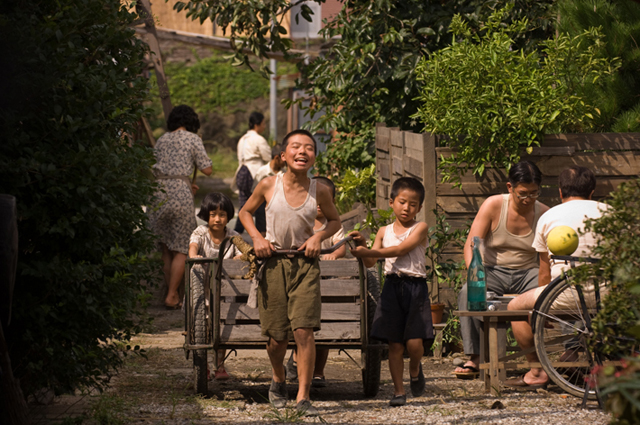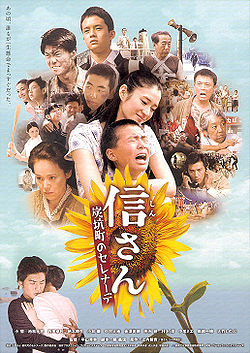[stextbox id=”grey” caption=”Shinsan: A Seranade in a Coalmine Town (2011)” float=”true” align=”right” width=”200″]
Director: Hideyuki Hirayama
Runtime: 108 minutes
Starring: Koyuki, Taichi Nakamura, Ren Kobayashi, Takuya Ishida, Sosuke Ikematsu
Country: Japan
Rating: Worth A Look (?)
[/stextbox]
Hideyuki Hirayama, who is a guest at this year’s Japanese Film Festival, continues his journey into the past with Shinsan: A Serenade in a Coalmine Town (信さん・炭坑町のセレナーデ), which travels back to a time when Japan’s own cinema was going through dramatic changes. The twin export industries of of coal and cinema were experiencing a boom, with the latter producing classics such as Akira Kurosawa’s Yojimbo, Kon Ichikawa’s Tokyo Olympiad and Hiroshi Teshigahara’s Woman in the Dunes. Yet while film went from strength to strength in the 1980s, coal reached its beak during the 1960s Post War era, and this is the background against which this film takes place.
It’s 1963, and single mother Michiyo (Koyuki, Space Battleship Yamato) returns to her coal-mining hometown in Fukuoka with her young son Mamoru (Taichi Nakamura, K-20: The Fiend With Twenty Faces). Mamoru is a bit timid at first, and is picked on by some local bullies. However, when child worker Shin (Ren Kobayashi) comes to his rescue, the two become fast friends and we trace their lives growing up together. Shin forms a special bond with Michiyo in particular. As they grow through adolescence, the older Shin (Takuya Ishida, Peak: The Rescuers) is unable to come to terms with those feelings, even as Mori (Sosuke Ikematsu, Drucker in the Dug-Out) begins to realise how important that is to everyone.
The slow-paced 1960s setting instantly recalls the cinema of the period, including the colour works of Ozu. Indeed, some of the earlier scenes in the film where the children are running about town are reminiscent of Ohayo, and the central figure of Michiyo could just as easily be one of Kenji Mizoguchi’s “fallen women”. However, Shinsan has its own definite pacing, and its melodrama over monotony in this small town. The isolation of Fukuoka in the 1960s, only accessible by ferry until the Shinkansen expansion in 1975, is not absolute in this film, as the intrusions of the outside world are felt through the shifting nature of the economy, the increased protests against the conditions in the mines and the constant discussions of moving to Tokyo.
Shinsan: A Serenade in a Coalmine Town is, as the name would imply, a piece of nostalgia. A sometimes frustrating realisation of a love that cannot, or perhaps will not, be and the growing sense of inevitability and sadness pervade the film, and a cast of capable young actors work with some familiar material. Although based on a novel by Tomoki Tsujiuchi, there is undoubtedly some of director Hirayama’s own fondness for the past here, having been born in Kitakyūshū, a city located in the same Fukuoka Prefecture that this film is placed. It has recreated the past, but as with the characters who ultimately sail away from the island via ferry in the closing moments of the film, it can only look back at it from afar.
[stextbox id=”custom”]An often moving and heavily nostalgic account of life in small-town Japan offers a change of pace from Hirayama’s historical epics Sword of Desperation and Oba, the Last Samurai.[/stextbox]
Shinsan: A Serenade in a Coalmine Town is screening on 20 November (Sydney) and 3 December (Melbourne) 2011 at the 15th Japanese Film Festival in Australia.






